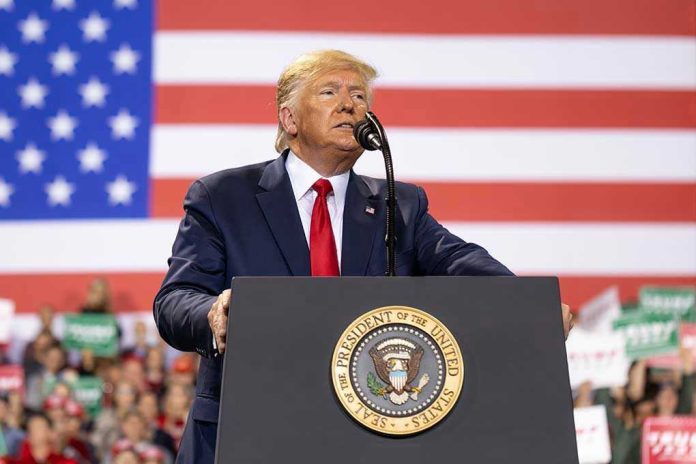
President Trump’s plan to mandate voter ID by executive order ignites fierce debate over constitutional authority and the future of American elections.
Story Snapshot
- Trump pledges a sweeping executive order requiring voter ID for all federal elections, reigniting the battle over election integrity.
- A federal judge blocked a similar attempt earlier in 2025, highlighting constitutional limits on presidential power.
- Public support for voter ID is high, but legal scholars warn federal intervention may erode states’ rights and spark new litigation.
- Opponents say the mandate risks disenfranchising vulnerable voters and threatens democratic norms.
Trump’s Executive Order Promise Rekindles Election Integrity Fight
President Donald Trump announced in late August 2025 his intent to issue an executive order that would require government-issued identification for all voters in federal elections. This marks the second time Trump has pledged such action, following a previous attempt earlier this year that was struck down by federal Judge Colleen Kollar-Kotelly on constitutional grounds. The renewed promise has triggered intense debate over whether the move defends election integrity or expands executive power at the expense of the Constitution.
Trump’s statements, delivered on Truth Social and at public events, positioned the executive order as a necessary safeguard: “Voter I.D. Must Be Part of Every Single Vote. NO EXCEPTIONS! I Will Be Doing An Executive Order To That End!!!” Legal experts and political analysts immediately responded, noting that the U.S. Constitution delegates election administration primarily to states and Congress, not the presidency. The absence of implementation details and legal precedent has left both supporters and opponents waiting for the administration’s next move.
Constitutional Limits and Judicial Pushback
The legal battle over federal voter ID mandates centers on constitutional authority. In April 2025, Judge Kollar-Kotelly blocked Trump’s first executive order, ruling that the president lacked unilateral power to set national voting requirements. The Constitution and decades of legal precedent place election regulation in the hands of Congress and state governments. The Supreme Court has upheld state-level voter ID laws, but has never ruled on a nationwide mandate issued by executive order. This unresolved legal terrain means Trump’s new pledge is likely to face immediate challenges in federal courts, with civil rights organizations and state officials poised to resist federal intervention.
Congress, meanwhile, remains divided on the issue. While Republicans generally back stricter voter ID laws citing fraud concerns, Democrats and voting advocacy groups argue such policies risk disenfranchising minorities, the elderly, and low-income Americans who may lack qualifying identification. The ongoing legislative stalemate has elevated the executive order approach, despite questions about its viability and constitutionality.
Public Support and Political Fallout
Polling consistently shows that a majority of Americans favor voter ID requirements, viewing them as common-sense protections against fraud. For Trump’s conservative base, the issue resonates deeply, symbolizing a stand against perceived abuses and lax security in previous election cycles. However, critics warn that a federally mandated ID law could impose burdens on millions of eligible voters, particularly those already facing obstacles to participation. The political polarization over election integrity vs. voter access has intensified in the wake of recent reforms and judicial intervention.
States traditionally manage voter registration and election processes, and many leaders have publicly opposed federal overreach, arguing it undermines local control and constitutional balance. If Trump’s executive order succeeds, it could set a precedent for expanded presidential power over elections, altering the framework established since the nation’s founding. Legal scholars caution that bypassing Congress and states risks eroding the separation of powers and public trust in electoral institutions.
Anticipated Impact and the Road Ahead
If implemented, Trump’s voter ID order would require significant changes to election administration nationwide. State election officials could face confusion and logistical challenges, while legal challenges would likely delay enforcement. In the short term, the announcement has inflamed partisan debate and mobilized grassroots organizations on both sides. Long-term effects may include shifts in federal-state relations, expanded executive authority, and new court battles over voting rights and access.
As the White House has yet to release specifics or a timeline, uncertainty reigns. Legal experts remain divided on the order’s prospects, but agree any action will shape the future of American democracy. For conservative voters, the fight for election integrity continues—and the outcome of this latest executive maneuver will have lasting consequences for the nation’s electoral system and constitutional principles.
Sources:
Trump says he will require voter ID by executive order
President Trump plans to issue executive order to require voter identification
Preserving and Protecting the Integrity of American Elections
Trump Voter ID Executive Order: What to Know



